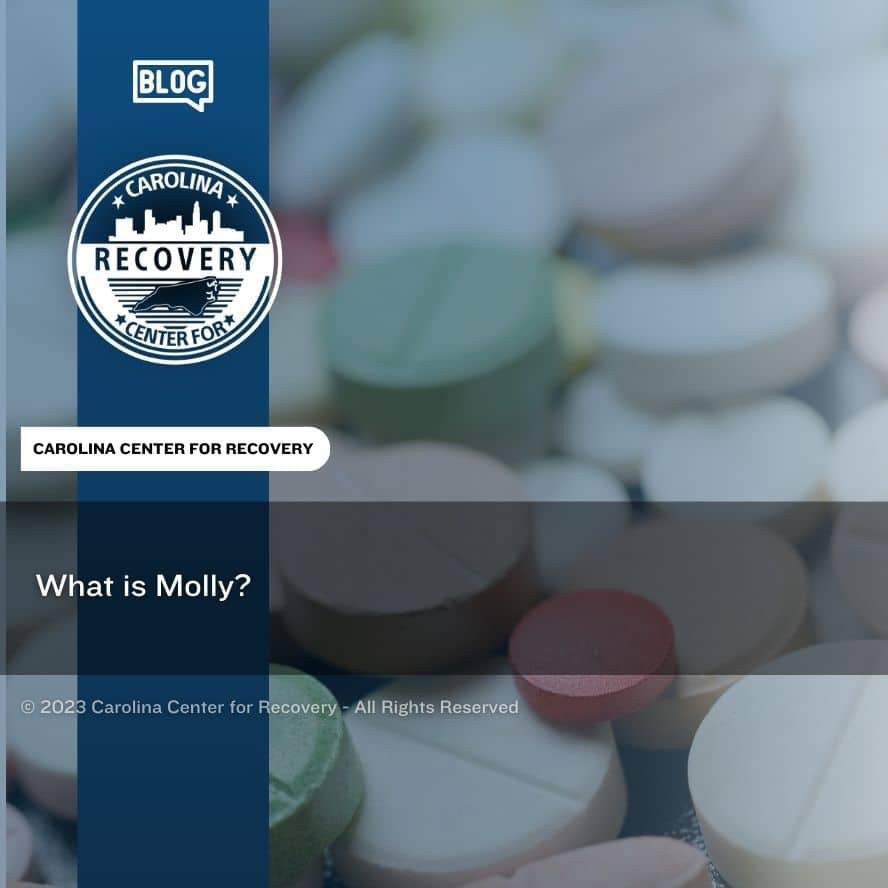What is Molly?

Medically Verified: 2/1/24
Medical Reviewer
Chief Editor

All of the information on this page has been reviewed and verified by a certified addiction professional.
Molly is a slang term for ecstasy. Ecstasy is a popular, illicit drug that causes euphoria and increased energy. Research from 2020 showed that about 2.6 million people reported using ecstasy in the previous year.
While molly may be a popular club drug, it is addictive and hazardous. The side effects of molly can be very dangerous. People may have a hard time quitting once they’ve started using ecstasy.
This article will explore molly abuse and addiction. You will learn how to identify ecstasy abuse and where to find treatment.
Contact the Carolina Center for Recovery specialists to explore our treatment programs. You may also verify your insurance or schedule an intake assessment.
Molly Abuse: Understanding the Effects and Risks
Molly is a term for MDMA, a popular illegal drug. Other street names for this drug include:
- Adam
- Eve
- Cadillac
- X
- Hug Drug
- Clarity
- Scooby snacks
- XE
- Candy
- Disco Biscuits
- Smarties
- E-Bombs
- Love Drug
Some of the street names for MDMA ecstasy reference the drug’s stimulant and hallucinogenic side effects. Common side effects include:
- Restlessness
- Mood changes
- Increased energy
- Altered sense of reality
- Heightened senses
- Deeper empathy
- A feeling of connection with others
- Lowered inhibitions
- Increased sexual arousal
- A desire for closeness and physical touch
In addition to the desirable side effects of MDMA, people may also experience:
- Fast heart rate
- High blood pressure
- Dangerously elevated body temperature
- Muscle tension
- Nausea
- Sweating
- Fainting or lightheadedness
- Chills
- Jaw clenching
- Aggression
- Irritability
- Memory issues
- Trouble maintaining attention and focus
- Anxiety and panic attacks
Some of molly’s effects on the central nervous system can be life-threatening. People may become dangerously overheated or experience other severe complications.
People who use molly regularly may experience long-term effects, including:
- Low libido or sexual dysfunction
- Impulsivity
- Depression
- Memory problems
- Cardiovascular disease
- Kidney failure
- Sleep problems
Combining MDMA and other substances can be dangerous. Dealers may combine ecstasy with other drugs, including fentanyl. It can be almost impossible to determine if another drug is being sold as ecstasy or to tell what active ingredient someone is taking.
Recognizing Molly Abuse and Addiction
There is not enough research to show that molly is physically addictive. However, people who use molly regularly may exhibit symptoms of addiction. They may find it very challenging to stop using ecstasy without professional help.
Recognizing the signs of an addiction can help you seek treatment to overcome it more quickly. Here are some of the most common signs of substance abuse and addiction:
- Taking a drug more often
- Using greater amounts of a substance
- Experiencing cravings for the substance
- Spending a lot of time and energy to get, use, and recover from using the substance
- Neglecting responsibilities, hobbies, and relationships
- Experiencing withdrawal symptoms if you stop using the substance
- Having social, legal, or financial trouble related to your substance use
- New or worsening mental health symptoms
- Wanting to stop using the substance but discovering it feels impossible to quit
- Isolating or only spending time with other people who abuse drugs or alcohol
People who develop signs of addiction to MDMA may require professional treatment and continuing support to stop using it safely.
Treatment for Molly Abuse
Addiction treatment programs can give you the support you need to stop using MDMA or other substances safely.
Drug addiction is a complex condition. Treatment typically occurs in stages, beginning with an assessment. The assessment will include:
- Questions about your substance use–what substances, how much, how long, etc.
- A mental health and medical history
- A family history of substance abuse and treatment
- A physical exam
- Lab testing
There are several levels of care in addiction treatment. Your treatment team will use the assessment information to recommend the right level of care to meet your needs. You may attend:
- Inpatient or residential rehab
- Partial hospitalization programs (PHP)
- Intensive outpatient programs (IOP)
- Outpatient rehab
If you have a physical dependence on MDMA or other substances, you may experience withdrawal symptoms when you stop taking them. Many people begin treatment in a medically-supported detox program. During detox, your treatment team will monitor your withdrawal symptoms and provide treatment to keep you safe and comfortable.
Detox treatment may include:
- Round-the-clock supervision
- Medications to reduce withdrawal symptoms
- Mental health treatment
- Emotional support
- A safe, secure environment
After completing detox, you must continue to participate in a comprehensive addiction treatment program.
During treatment, you will work to identify and understand the roots of your substance use. You will learn skills to avoid relapse.
Your treatment plan may include:
- Individual, group, and family counseling
- Behavioral therapies
- Mental health treatment
- Medications
- Relapse prevention education
- Coping skills practice
- Exercise, mindfulness, nutrition support, and other holistic therapies
- Aftercare planning
These treatments can help you put addiction in the past and begin to work toward a healthier future.
Find Help Now
If you or someone you love struggles with molly abuse or addiction, you are not alone. Effective, compassionate treatment is available at the Carolina Center for Recovery.
Contact our intake specialists now to learn about our treatment programs or to schedule appointments.

